Unlock the knowledge you need to harness the potential of AI tools for writing so you can write better, faster, smarter. With the advent of powerful tools like ChatGPT and others, many freelance writers wrongly assumed it was game over for their writing career. Maybe you were worried about that, too! However, once you start using the best AI writing tools daily, you’ll see that while they do indeed have an impressive skillset, they’re not ready to replace you.
The fact that they can’t replace you does NOT mean you don’t need to learn how to use AI to write articles and other content. Nor does it mean that you should ignore the explosion of AI for blog writing (and any other type of writing you can imagine!) that’s come out on the market. Because here’s the thing: the most efficient, fastest, and in-demand writers will be those who learned how to use AI for blog writing and other content, and my strong belief is that you’ll be left behind if you don’t learn how to do it, too.
Ultimately, just like the calculator transformed the way the average person does math—but didn’t replace all the mathematicians—the best AI tools are going to do the same for writers. So, if you want to stay ahead of the curve and be a part of this writing revolution, you’re in the right place. You’re about to learn the most important things you need to know about how to make the best use of AI in your writing, in an ethical manner of course!
You may be worried about the cost of such tools, and I don’t blame you. Often new technologies cost big bucks, after all! But I’ve got good news for you! 2 of the best options are actually FREE AI tools that I’m going to tell you about later in this article.
In this article, you’ll learn about the following:
- How AI writing tools work
- 3 important problems with AI writing tools, and how to handle them
- 5 ways AI can help you write better, faster, smarter
- An overview of AI prompting techniques that enhance, expedite, and elevate your results
- The best free AI writing tools
How AI tools for writing work
The current rage is large AI language models, like GPT-4 from OpenAI. These models are built using a type of machine learning called transformer neural networks, which excel at handling sequential data, such as text. The reason text is considered to be sequential data is because each word is somewhat dependent on other words that come before it. Here are some examples of what I mean by that:
Take a look at the following sentence, that is completely lacking context: “The apple was ______.” Based on the lack of context, that final word might be “red”, “expensive’, “delicious”, “rotten”, and so on. We’d really have no way of knowing what that final word should be, so we’d have to make our best guess.
But what if we were given more context: “I was hungry so I grabbed an apple out of my refrigerator. The apple was ______.” Now there are a smaller number of options that would make sense for that final word. In this scenario, for example, it’s more likely that the sentence would end with “delicious” than “expensive”. And since it’s in the fridge, it’s probably not rotten. Lastly, commenting on the colour of the apple is less unlikely in that context.
But what if the context was instead something like this: “An apple had fallen off the tree and flies were swarming around it. The surface was wrinkled and puckered. The apple was ______”. In that scenario, a more likely word for the ending might be “rotten”, and we definitely wouldn’t choose something like “delicious”.
Keep those examples in mind as we get back to the topic of AI tools for writing and how they work.
These tools were trained on millions of sentences to teach them what our language should look like. During that training, the AI large language model starts to recognize patterns and associations between both words and phrases, as well as the contexts in which they are typically used. For instance, it learns that the word ‘sky’ is often associated with ‘blue’ and that ‘I am’ is usually followed by a verb or an adjective. It also learns to understand the syntax, grammar, and to some extent, the semantics of the language. When generating sentences, it considers the context, then, one word at a time, it chooses the word it thinks has the highest probability of coming next. Once trained, these LLMs can easily generate human-like text that is contextually relevant and coherent.
Remember the process we went through to decide which word is most likely to come next in our sentence, “The apple was _______.”? That’s essentially how these large AI language models work. The main difference is that they are capable of running complex analyses to determine the word that’s likely to come next, they can draw from a larger vocabulary than most humans can, and they can “think” of the answer faster than we can.
I’m going to show you some of the many ways that AI can help you become a more efficient, productive writer. But before I do, there’s an important question that I feel like we need to lay to rest. Since these AI tools for writing can generate content faster than we can, you may be wondering how on earth it’s possible that they won’t eliminate the need for human writers, right?
Well, although they do indeed have superpowers when it comes to writing, they have weaknesses too. And if you’re going to use these powerful tools, you need to know about them.
3 important problems with AI that all writers need to know about
AI problem #1: they can’t reason well enough
Although currently available LLMs mimic understanding of text and seemingly reason their way through certain simple problems, they don’t truly comprehend content as well as humans do. They can generate responses based on patterns and associations, but not actual understanding or consciousness. Here’s a classic example of that.
I asked ChatGPT4—the most advanced LLM currently available to the public—to tell me how it would stack the following items in a stable manner:
- a textbook
- 7 eggs
- a laptop
- a coffee mug
- a toothpick
Its reply started out okay, but soon took a wrong turn. Check this out:
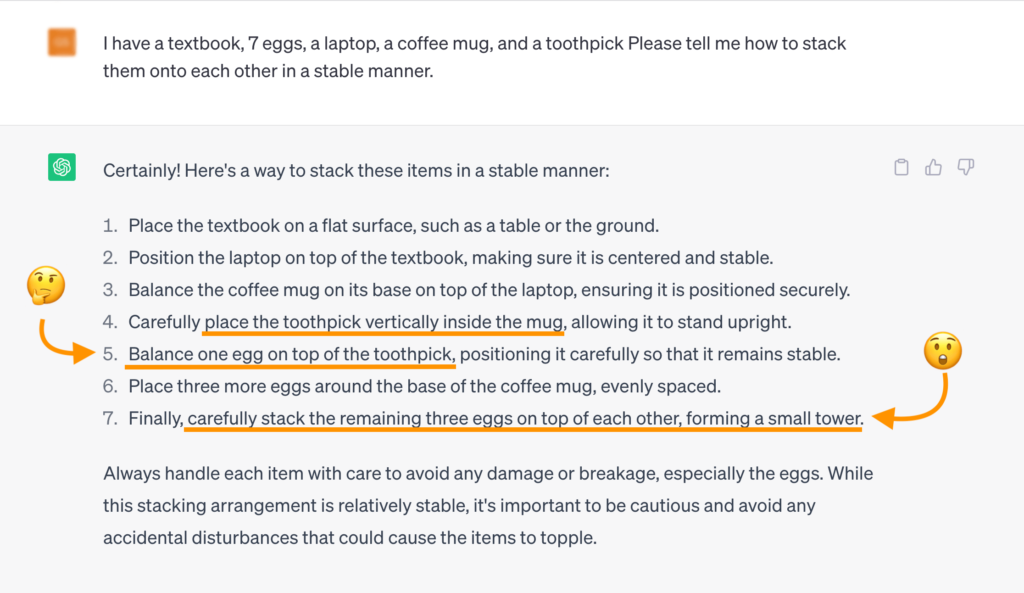
A human would never have made the mistake of suggesting we stand the toothpick on its end and balance even a single egg on top, right?!
As you can see, this AI—advanced though it may be—simply can’t reason like a human can. Humans would know better than to try doing this ?:

What do do about it
Well, the main thing is to always keep in mind the fact that the AI is kind of like an eager-to-please child in terms of life experience, but with super-intelligence.
The AI knows a lot of stuff, but like a small child it has a very limited experience of the world and that causes it to misjudge things at times. In our stacking objects example, the reason the AI made such silly mistakes is because it didn’t understand enough about the nature of the objects I asked it to stack. It hadn’t been taught that eggs will roll off one another if we try to stack them. It didn’t know that balancing an egg on top of a toothpick standing on end would be exceptionally difficult and, by human standards of balance, would not be considered stable. Its training data didn’t cover the question of how a textbook, eggs, a laptop, a coffee mug, and a toothpick could be stacked in a stable manner. So, all it could do is make an educated guess… and whoops! It guessed wrong.
So, you need to always be aware that the AI could make a mistake like that at any time. For the above example, you knew enough the nature of eggs and toothpicks to instantly realize that the AI made a mistake. But if you’re asking it to write content on a topic that you know less about, you won’t know enough to recognize when the AI’s reasoning is messed up. So, the solution to this problem is to meticulously fact check any content the AI creates for you before you allow it to be published. And that brings me to our second big issue with AI…
AI problem #2: they can ‘hallucinate’
Nope, the AI doesn’t need a psychiatrist and psychotherapy won’t help. ? “Hallucinate”, in the context of AI, means that the AI gets confused and can’t sort out fact from fiction. Or, if you want to a more technical definition, an AI hallucination occurs when the AI generates or interprets data in a way that doesn’t accurately reflect reality. This could result from an over-interpretation of its training data, a lack of sufficient context, or some other reason. It’s as if the AI is ‘seeing’ or ‘imagining’ things that aren’t there, which is analogous to a human hallucination.
When AI tools for writing hallucinate, they generates content that may sound extremely plausible and reasonable, but is actually inaccurate, speculative, or downright fictional. And the tricky thing for us humans is that the AI’s confident-sounding tone makes it very tempting to believe everything it writes is true: the AI will sound like it really knows what it’s talking about, complete with perfect grammar, syntax, and tone.
Aside from obvious ethical concerns that surround publishing untrue content, anyone who does that—whether intentional or not—may put themselves at risk of legal issues, because ultimately they’re responsible for ensuring that the things they claim in their content are actually true.
In my experience, more advanced AI tools for writing, like ChatGPT4, certainly don’t hallucinate all the time, or even most of the time. In fact, according to a GPT4 technical report, ChatGPT 4 is 40% more accurate than ChatGPT3.5. Nonetheless, even the creators of ChatGPT, OpenAI, recommend taking great care with content generated by ChatGPT because it is not infallible. And as you can imagine, for certain high stakes topics where it’s crucial for things to be 100% accurate, it would be irresponsible to publish AI-generated content without human oversight.
What to do about this
Ultimately, for content that needs to be factually accurate, human oversight and fact-checking is needed, regardless of how authoritative or confident the AI’s writing seems to be.
Reputable writers (and their clients) will insist upon high-quality, accurate information. And currently the only way to guarantee that any information produced by an AI is accurate is to have a human polish and fact-check it.
Obviously some people will be unscrupulous and say whatever they want without regard to truth. But most people care about their reputation and doing what’s right—so, they have a strong desire to publish factually accurate content. For that reason, human writers will still be needed.
AI problem #3: AI and ChatGPT copyright issues
In the U.S., there’s a big problem with content created by AI tools for writing: copyright protection cannot be granted for that type of work. Now imagine that you—or your client—decides to generate a bunch of content for their website, a video script, or a book, that’s solely written by an AI. Well, since such content is currently not eligible for copyright protection in the U.S., any random person on the internet can legally copy it and use it however they see fit. They can even put it up for sale and pocket the profits! Wild, huh?
In order to copyright AI-generated content, a human needs to make it substantially different. And nope, just changing the odd word here and there won’t cut it. So, if you—or your freelance writing clients—want to own exclusive rights to your content, an AI can’t do all the work of writing it.
Copyright protection allows you to own exclusive rights to your own work and—if you choose to do so—to earn a living from the hard work that went into planning the content, preparing it, editing it, publishing it, promoting it, and so on. A lot of time goes into doing all of those tasks, and given that almost no-one an afford to work for free, copyright protection is very important to writers and other creators.
A March 2023 Statement of Policy from The U.S. Copyright Office says the following:
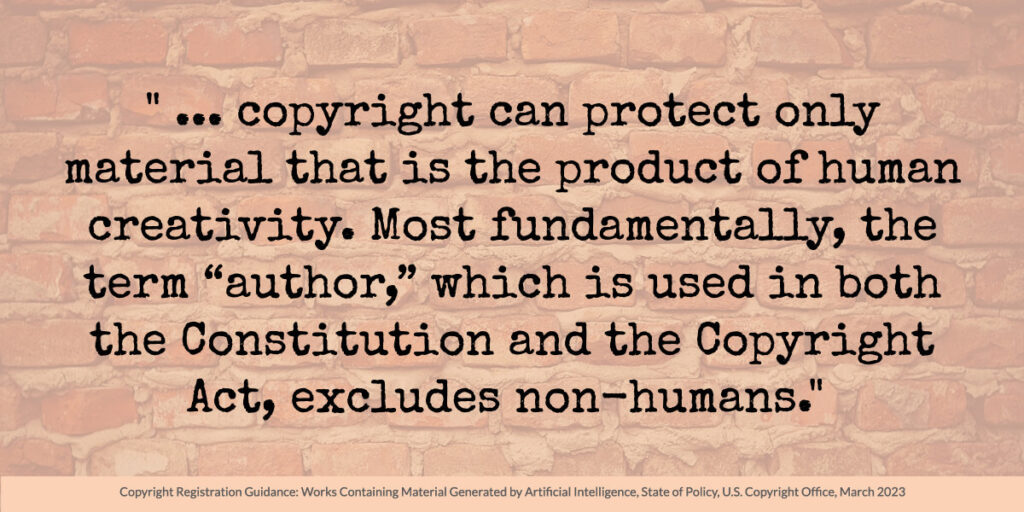
If you’re anything like me, you’re probably wondering if the fact that a human is the one who gave the AI instructions (i.e. the prompt) is sufficient to make the AI’s output a product of human creativity for the purposes of copyright law. But the answer is a hard no. Check this out, also from the same statement:
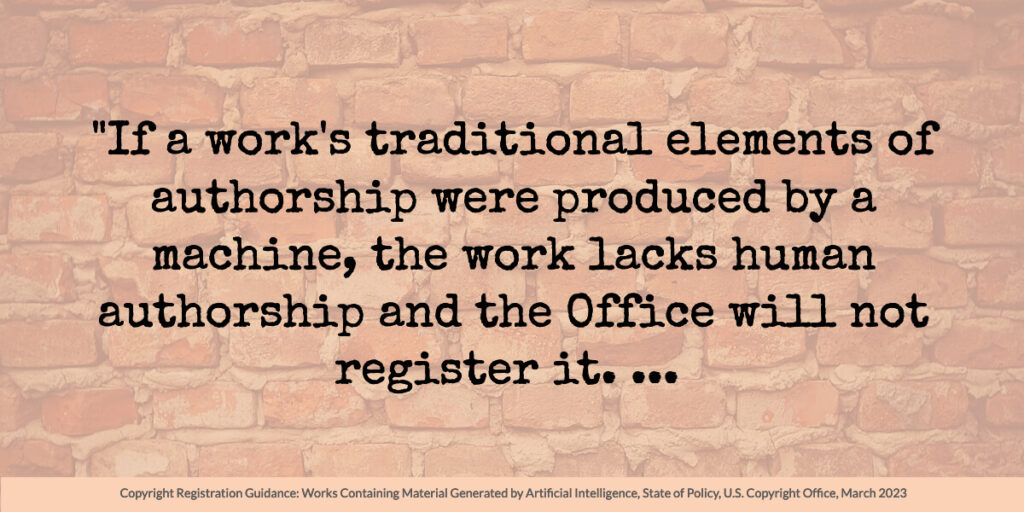
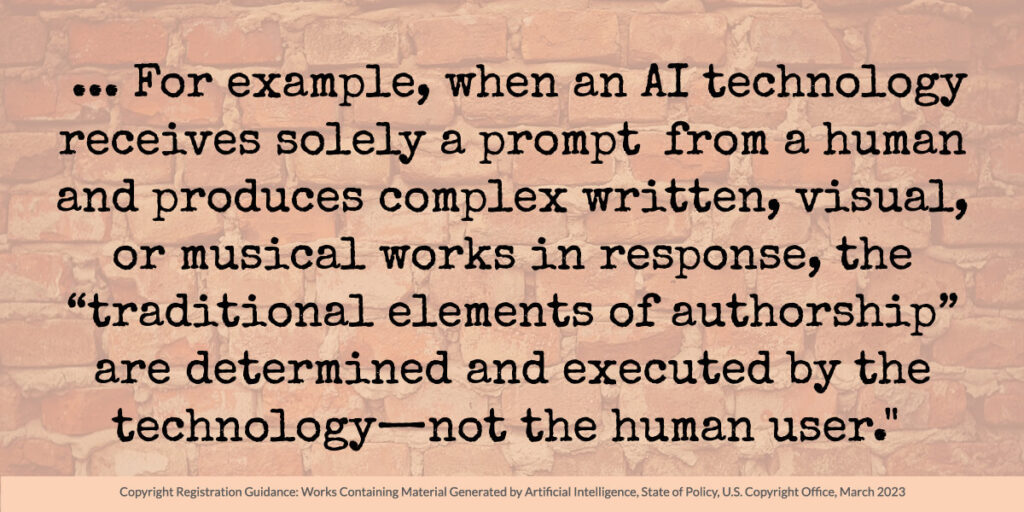
What do do about this
The takeaway from that is that IF you (or your client) wants the AI-assisted writing you do to be eligible for copyright, you need to make sure that you change it up enough to truly make it your own. My advice on the best way to do this is to use AI tools for writing to help you brainstorm, to create structure for your content, and to break past episodes of writer’s block, but don’t use them to completely take over all writing tasks.
Future-proof your skills and learn how to be a competent user of AI tools for writing
Whatever you do, don’t be one of those people who fear new technology and refuse to learn how to use it. It’s normal to feel unsettled by the rapid rise of AI, but whether we wanted it or not, “the genie is out of the bottle!” and it’s here to stay. So, as I’m sure you’ll agree, the smart move is to master these tools and make them work for you.
One thing I can say for sure is that if you’re anything like me, these AI writing tools are about to become the best brainstorming buddy and writing partner you’ve ever had.
5 ways AI can help you write better, faster, smarter
- The next time you’re stuck on how to write up an article for a client, ask the AI for suggested headlines, sub-headlines, main topics and subtopics. You don’t have to use all of its suggestions, but odds are you’ll get at least a few great ideas to get you started!
- It can help you with SEO writing. Regular readers know that SEO writing is how I got my start in freelance writing. And these AI writing tools are fantastic for that: if you’ve ever been unsure about how to work a tricky keyword phrase into your content, ask the AI for help and it’ll be glad to oblige.
- AI tools for writing can come up with a great way to word just about anything. If you can’t think of how to describe something, reword a passage, or explain a concept, an AI text generator can figure it out for you.
- AI writing assistants can help you write your emails (and especially those tricky ones that require an extra dose of tact!), and even social media updates.
- It’s one heck of a grammarian. If you’ve ever wondered whether you should word something this way or that way, rather than spend goodness-knows-how-long Googling it, AI writing tools can give you the answer you need in a flash!
So, how do I use AI in my writing?
I tend to limit my use of AI tools for writing to brainstorming and outlining. In those cases, I can write the content faster myself than I can write a prompt for the AI, edit its work to make it say exactly what I have in mind, and then fact check it. In other words, if you’re reading one of my blog posts or one of my books, I’ll only have used the AI to help brainstorm, and I’ll have written the actual content myself.
I also love using AI for my grammar questions—worst case if it tells me the wrong thing, it’s not like a grammar mistake is going to hurt anyone (i.e. putting my trust in the AI for grammar advice is low-risk). But, usually the AI is bang on and asking the AI is MUCH faster than Googling. ?
Is it a good idea to use AI to write entire articles?
If you’re writing about a topic that you don’t know well, using AI to write the content in its entirety may be faster than doing it all yourself. ***But IF you’re tempted to try that route, make sure you don’t forget to take into account the 3 main problems with AI, which were covered earlier in this article!
Also, because spammy websites are starting to use AI to write all of their content, with ZERO regard to quality, pure-AI content is starting to get a bad rap. Some SEO experts suspect that at the current time, using content that’s 100% written by AI will get a website penalized in the search engines. Personally, I agree with their risk assessment. So as much as I love AI as a brainstorming buddy, I don’t see myself using it to write all of my content any time soon.
Learn AI prompting techniques that enhance, expedite, and elevate your results
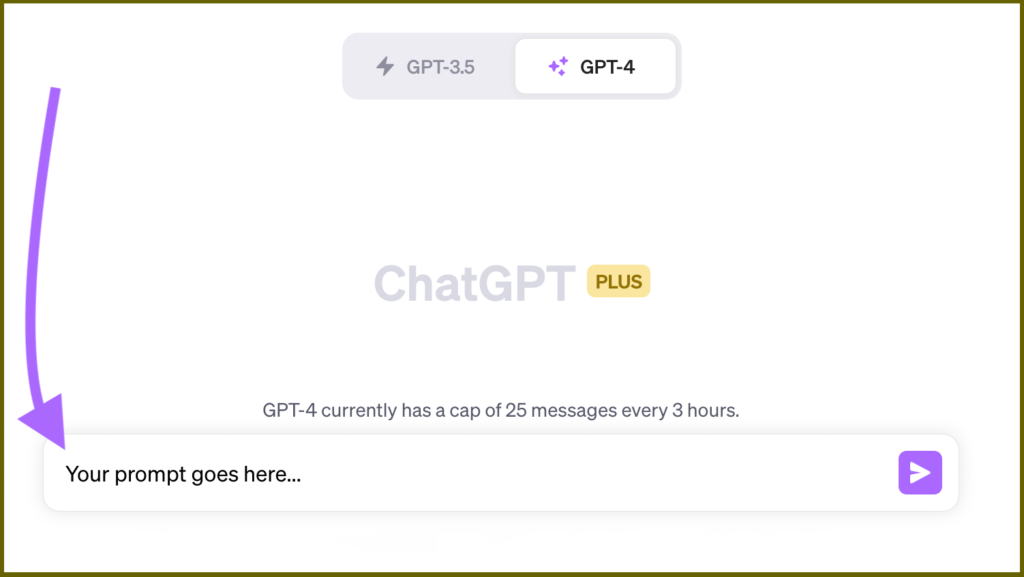
To put it simply, “prompting” refers to the instructions you give to the AI. Using an effective AI writing prompt will transform your interactions with it into powerfully productive work sessions.
8 reasons why you need to learn prompting for AI
- Improved Efficiency: Good prompts will lead to more accurate and desirable responses from AI tools for writing, reducing the time needed for corrections or re-prompting.
- Better Quality Content: Mastering the art of AI prompting can result in high-quality ideas for phrasing that more closely matches your intent.
- Creativity Enhancement: An effective AI writing prompt can unlock the potential for unique perspectives and creative suggestions.
- Higher earnings per hour : Mistakes or misunderstandings due to poor prompting can result in wasted time. If you’re billing by the project or per word, less time wasted means you earn more per hour of your time.
- Control Over Content: Effective prompts help ensure AI tools for writing produce results that align with your vision, ethical guidelines, and content standards.
- Versatility: The better your AI prompting techniques, the wider the range of tasks you can accomplish with the AI: they can help you to brainstorm ideas, outline articles and video scripts, draft tactful responses to tricky emails, and so much more.
- Scalability: AIs can generate a large amount of ideas and content quickly. Good prompting skills allow this to be done without sacrificing quality, enabling you to handle larger projects in a shorter timeframe compared to what they can do alone.
Important tips for effective prompting of AI tools for writing
There are many more tips than this one article can cover, but here are a couple of key principles for effective prompting of AI tools for writing:
First, remember to be specific in your AI text prompts. For example, don’t just tell the AI to “write an article about pest control”. Instead, provide the AI with more details such as the exact topic of the desired article (ex. how to get rid of squirrels in your attic”, who your intended audience is (ex. homeowners), what tone you need for your content (ex. conversational), and so on.
Second, if you need a complex result, lead the AI through the process step-by-step. Prompting is an iterative process, not a one-shot deal.
Think of it like having a conversation with a new virtual assistant: If you wanted to assign a new task to your VA, you’d first outline the project and ensure they understand. You’d likely provide them with some background information. Next, you’d go through each section of the content they’re going to help you create and discuss how they can best help you.
The best free AI writing tools
After playing around with currently available options, I believe the best free AI content generator is a tie between ChatGPT and BingChat. At the time of this writing, you can use OpenAI’s ChatGPT3.5 for free on the OpenAI website. The closest you can get to free use of ChatGPT4 is to use BingChat, since ChatGPT4 powers it.
Bing Chat
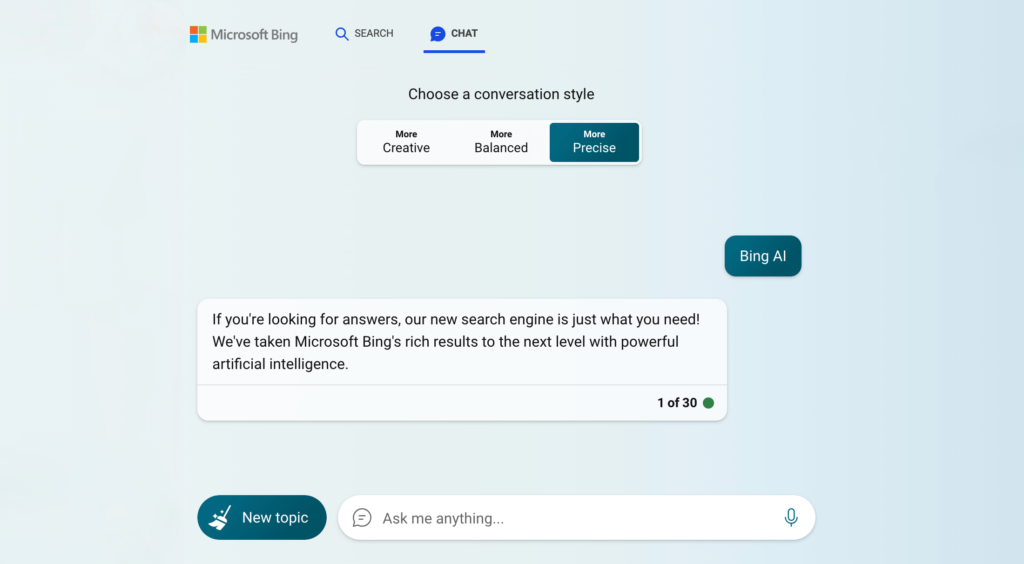
If you want the best free AI writer around, trying out Bing Chat will be worth your while. At the time of this writing, the easiest way to get access to it is to download the Microsoft Edge browser. You should see the option to select “Bing Chat”, but if not, try logging into your Microsoft account and then check again. Alternatively, when you’re using Microsfoft Edge, you can try going to Bing Chat directly here (Important: that link will only take you to Bing Chat IF you use it in Microsoft Edge). Last but not least, there may be a wait list to get access to Bing Chat… if so, I recommend you sign up because it’ll definitely be worth your while!
The next thing you need to know about using Bing Chat as an AI text generator is that although it’s powered by ChatGPT4, it’s designed to function as a search engine. However, you can get ChatGPT-like behavior out of it by asking it for to help you brainstorm, to generate content outlines for a blog post or article, and to generate sample text for you on the topic of your choice.
Bing Chat gives you the option of using it in one of three different modes: More Creative, More Balanced, and More Precise. I tend to use the extremes of More Creative and More Precise the most often. One important thing you need to know is that while all three modes have the potential to hallucinate, you’ll likely run into more AI hallucinations with More Creative mode. So, to minimize the amount of factual errors that you need to correct, you may find yourself using More Precise mode more often.
ChatGPT
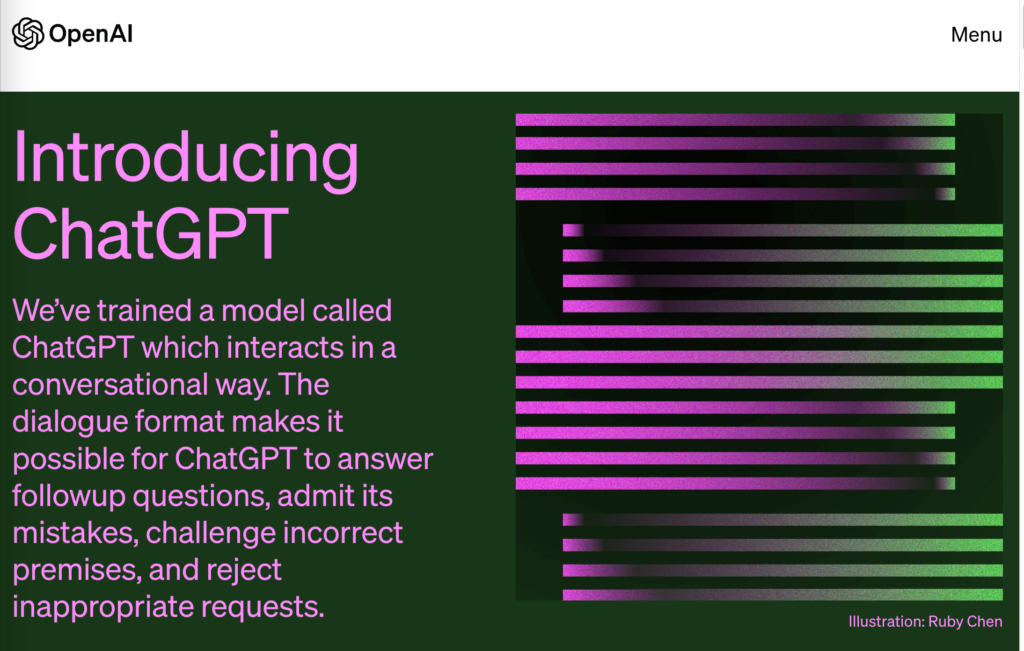
ChatGPT is the OG of the new generation of AI tools for writing, and it is the bomb! I adore ChatGPT and use it every single day. Literally.
Currently, the best model that free users can get access to is GPT3.5, since GPT4 is reserved for paying users. However, I can assure you that GPT3.5 is still excellent. Here’s a fun example of the kind of things you can do with it: I used it with my son to brainstorm plots for a trilogy of novels, to brainstorm chapter outlines that fit with Blake Snyder’s popular “Save the Cat” method for story structure, and so much more. The AI aced it, every step of the way.
The biggest advantage of ChatGPT over Bing Chat is that you can input more text into your prompt—that means you can provide the AI with far more detailed information about the output you want from it, which can make a huge difference in the quality of the output. Also, the fact that you can use very short or very long prompts with ChatGPT provides you with far more flexibility compared to using Bing Chat as an AI for blog writing, etc.
Ethical concerns with an AI text generator
Ethical use of AI, or the lack of it, stirs up a lot of strong feelings, but I think it’s important to discuss it anyways. Let’s dive into some common concerns.
Concern #1: Plagiarism
In theory, large language models like ChatGPT are generating text withOUT copying it word-for-word from their training data. However, it’s impossible for regular people like you and me to verify that since we simply don’t know what was contained within its training data. In other words, we can’t cross check to ensure no plagiarism is taking place within content generated by ChatGPT.
However, as an experiment, I often run content generated by ChatGPT through Copyscape to see if any plagiarism of online content is detected. For whatever it’s worth, every single time I’ve done this, ChatGPT’s writing passes the test.
So, based on that, I’m assuming ChatGPT is either not plagiarizing content at all, OR, it does it so rarely that I haven’t caught it doing it.
That being said, if you ever feed a bunch of text into ChatGPT and ask it to help you reword it, ChatGPT will not automatically assume it needs to avoid plagiarizing the content you fed it. In ChatGPT’s defense, for all it knows, the content you fed it was your own creation, right? So, be sure to account for that in your prompts and eventual editing. As a human, it’s your job to check these things to the best of your ability.
Also, if ChatGPT spits out some fact that you know isn’t common knowledge, I recommend you do some research to figure out the source of that fact . The, you can reference the original source and provide credit in your final published piece.
Another concern relating to plagiarism essentially relates to the unfairness of it all. People will say it’s not right that the AI was used to basically suck up all the human-generated information on the internet without compensating those humans, and then be used for profit. And it get it… it stings to for content creators to know their hard work was so effortlessly assimilated into the AI’s knowledge, with pretty much zero work on the part of the AI… and then the AI is just gong to mash it up and spit it out for other users and businesses to use as they like. I don’t have an answer for this, other than to say that what’s done is done and I don’t see a way to undo it. However, one consolation is that currently any of us can use OpenAI’s ChatGPT for free, and I feel like that helps equalize the playing field at least a tiny bit.
Concern #2: The potential for AI to eliminate jobs
To be perfectly honest with you, I believe it’s true that AI is indeed going to eliminate some jobs. However, it doesn’t look like anyone is going to regulate AI out of existence, so, that means it’s likely here to stay. Individuals and businesses are going to make use of it regardless of what you or I might think about the morality of it causing job losses.
Given that fact, my hope is that the overall end result will be the creation of new jobs that perhaps we can’t even imagine today. Once upon a time humans were hunters and gatherers, yet today almost no-one is. Technology continues to advance and as old jobs become obsolete, new ones are created. So, it seems reasonable to hope that the age of AI will lead to the creation of new jobs, too.
In the meantime, AI is kind of in its early stages, so, I think our best bet is to learn to use it effectively. Especially for my freelance writing peeps, AI is going to be used extensively in this line of work, so we might as well become the people who use it to boost our productivity and get more done. Personally, I’m looking forward to saving a ton of time because now that I have ChatGPT as my new brainstorming buddy, I can generate content outlines faster, whether it’s for non-fiction books, blog posts, or even a novel.
Concern #3: Unfair bias in AI
Researchers have indeed found incidences of bias in various AI tools. So, it’s definitely important to recognize that this can occur. My view is that reputable companies who’ve created AI tools will improve this with time. However, while we wait for such problems to be solved, we as users will have to take responsibility for keeping the possibility of bias in mind and eliminating it when we see it.
Concern #4: The potential for AI-generated content to be passed off as human-generated
Currently I think the biggest risk surrounds people trusting the AI’s output too much and publishing the content it generates without doing a thorough review and fact-check of it first. Due to the potential for AI hallucinations as discussed above, smart writers will fact-check any AI-generated content before they use it.
AI tools for writing and you
You may be excited about the potential of AI to help you, or worried about what might happen next… but regardless of where you stand, don’t ever forget that knowledge is power. So, don’t stop reading about AI and what it can do!
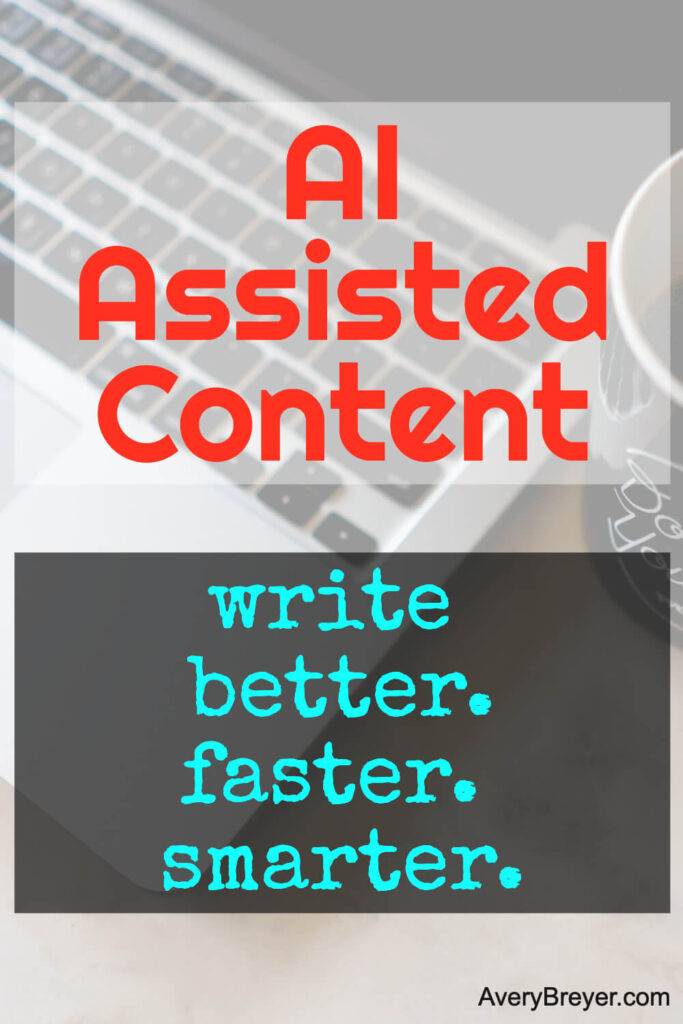
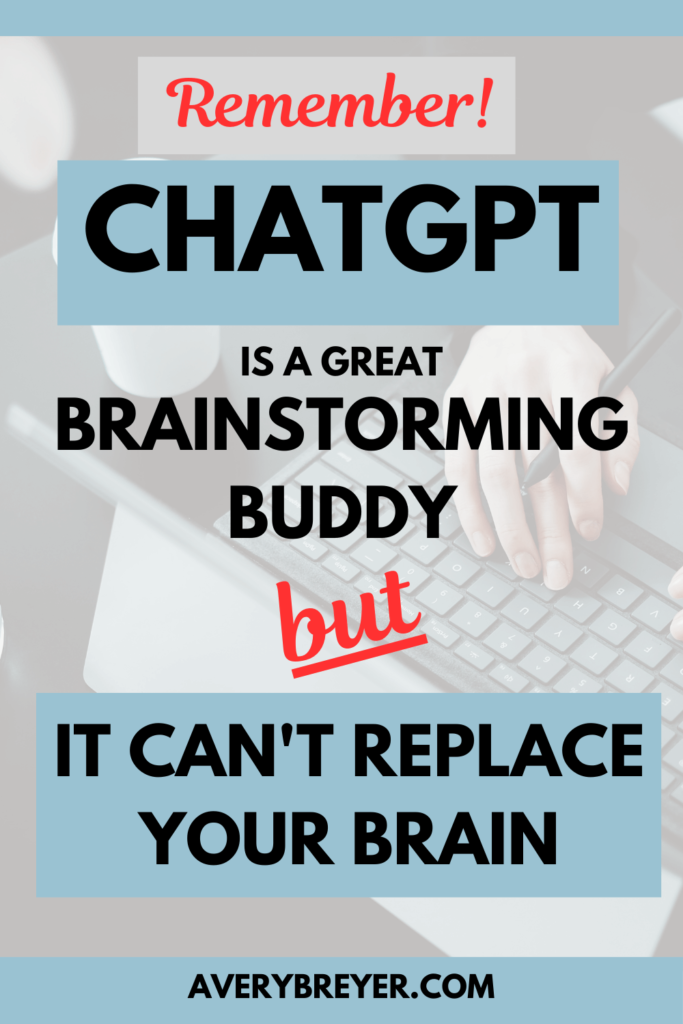
Leave a Reply